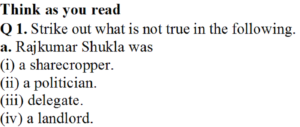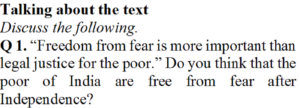English CBSE Class 12 NCERT Flamingo Chapter 5 Indigo Free Solution of Textbook Questions and Answers
INDIGO
(Text Book Questions & Answers)


Answer: Rajkumar Shukla was not a politician. He was not a delegate. He was not a landlord


Answer: Rakjumar Shukla was not physically strong.


Answer: Rajkumar Shukla had come to the congress convention to take Gandhiji to Champaran. He repeatedly requested Gandhiji to fix a date. Shukla followed him wherever he went. And finally Gandhiji agreed to come to champaran.
Owing to his determination to take Gandhiji to Champaran, he is described as ‘resolute’.


Answer: Servants knew that Shukla was a farmer. Gandhiji was with him. Gandhiji always used to wear simple clothes. So servants thought that Gandhiji is also a peasant.


Answer: They had first met at Lucknow. Gandhiji visited Cawnpore and some other parts of the country. He visited his ashram in Ahmedabad. Then he had come to Calcutta. He visited Patna, Muzzafarpur and then went to Champaran.


Answer: Peasants were paying all the crop of Indigo grown on 15% of their land as a rent. This was the long term agreement.
Now British wanted to free the peasants of this long term agreement. But they wanted a compensation from peasants for this. Because due to synthetic indigo, demand of natural indigo had reduced
Development of synthetic indigo would reduce the price and demand of natural indigo.


Answer: Before taking up cause of peasants, he collects evidences and finds the truth. He pleads guilty in the court for refusing to accept the orders. He sends all the evidences to various authorities. These instances speak about his belief in truth and satyagraha.
When large number of people had gathered outside the court room, he helped officials in controlling the crowd. He found a solution of the problems of peasants through a peaceful talk. These are the instances of his belief in non-violence.


Answer: Gandhiji had demanded refund of 50% while landlords offered to pay 25%. To break deadlock in the discussion Gandhiji accepted refund of 25% money.
Thus landlords were forced to give some money and their prestige. According to Gandhiji this was more important than the amount of refund.


Answer: The peasants gathered in large numbers outside the court to show their support to Gandhiji. They had started thinking that they also had a right to express themselves. This was the first change.
By getting a refund, they got the lesson that they too have a right. This was the second change.
The landlords had to come to the discussion. They agreed to refund some money. Eventually the sharecropping vanished. It eliminated the fear in farmers. This was the third change.
Finally, a social and cultural change was brought in the society. Schools were opened and healthcare facilities were started. This was made possible through voluntary work of many people.


Answer: It was an attempt to remove problems of poor farmers. Gandhiji got support from lawyers, teachers and thousands of farmers. Gandhiji had said that he had done very simple thing. He proved that he could not be ordered by British in his own country. All these laid foundation to his future struggle for freedom of India.
Therefore Champaran episode was the turning-point of his life.


Answer: Gandhiji scolded lawyers for charging fees from poor farmers.
Gandhiji was ready to go to prison for the cause of local farmers. This motivated lawyers to give full support to Gandhiji.
By refusing to accept support of Andrews, Gandhiji taught a lesson of self-reliance.


Answer: Local people were very afraid to provide any support or sympathy to those who advocated home-rule movement.


Answer: Prof JB Kriplani came with large number of students, to receive Gandhiji at Muzzafarpur. Many sharecroppers came to meet Gandhiji. Several lawyers met Gandhiji and supported him. A large crowd had gathered outside the court room.
These instances indicate that ordinary people had also contributed to the freedom movement.


Answer: During Champaran episode, Gandhiji had worked for getting recognition for the rights of farmers. It was very important part of the event that fear of farmers was removed. They started believing that their voice could be heard. And finally they got justice. The sharecropping disappeared.
Even today, the poor continue to live in fear. They are always scolded and given unequal treatment in society. The basic human and constitutional rights are denied to them. Their life is an endless misery. Poor are becoming poorer. Situation of small farmers is also bad. They continue to live in fear of money lenders and powerful people.
More often than not, common people are adversely affected by the influential people of the society.
It is matter of pity and shame that poor and common people of India continue to live in fear.


Answer: A leader is someone who inspires his team to achieve something they had themselves not thought of. He demonstrates quality of hard work, dedication and perseverance. A leader believes in himself and his team.
Many times people are engaged in non-critical activities and thus fail to achieve the goal. The leader should be able to differentiate between the two to remain focused.
The leader must show respect to every member of his team. He should be a guide and mentor to his team.
****


0 Comments